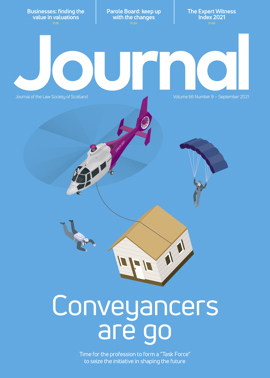Finding the value in valuations

Outer House decisions regarding financial provision on divorce in recent years have largely featured themes of unequal division, whether source of funds arguments in terms of s 10(6) of the Family Law (Scotland) Act 1985 or economic disadvantage arguments in terms of s 9(1)(b). However, in the past few years another theme has emerged: the interaction between the court and the expert witness, valuation experts in particular. It is possible to draw out some very practical implications for agents instructing expert witnesses in the specific context of business valuation for financial provision.
It is useful to begin with a reminder of the guidance given by the Supreme Court in Kennedy v Cordia (Services) [2016] UKSC 6; 2016 SC (UKSC) 59, to the effect (at para 57): “It falls in the first instance to counsel and solicitors who propose to adduce the evidence of a skilled witness to assess whether the proposed witness has the necessary expertise and whether his or her evidence is otherwise admissible. It is also their role to make sure that the proposed witness is aware of the duties imposed on an expert witness.”
At para 44 of its judgment, the Supreme Court set out four considerations which govern the admissibility of skilled evidence, namely (i) whether the proposed skilled evidence will assist the court in its task; (ii) whether the witness has the necessary knowledge and experience; (iii) whether the witness is impartial in his or her presentation and assessment of the evidence; and (iv) whether there is a reliable body of knowledge or experience to underpin the expert’s evidence.
Agents are the first line of assessment of the admissibility of the evidence of the expert witness, and primarily responsible for making sure that experts are aware of their duties. Three recent financial provision decisions from the Court of Session illustrate the range of the court’s reaction to expert evidence.
A v A [2020] CSOH 54
A v A, a decision of Lady Wise, neatly illustrates the practical import of these passages. Summary and analysis of the expert valuation issues arising can be found in Fiona Sasan’s briefing at Journal, August 2020, 32. The key practical point is that the report of one expert contained no reference to his duties to the court. That was a backdrop against which other errors took on more significance than they might otherwise, and opened the door to a finding that the expert had allowed himself to be influenced by the views of the party instructing him.
Jewellery valuation issues also arose. The parties led evidence from competing experts. One set out her qualifications and professional memberships, and described her methodology which followed the standard laid down by the relevant national association. The other had long experience but no equivalent registration, nor had he applied a nationally recognised standard approach. Crucially, one of the parties had personally requested the valuation, and the court noted that his instructions were casual and there was some confusion about the basis of valuation. These are all factors which influenced the court and are easily avoided by agents when instructing valuations, and perhaps usefully reinforced at pre-proof consultation.
Lady Wise’s decision was reclaimed. Lords Malcolm, Woolman and Pentland refused the reclaiming motion, which focused on the treatment of the expert evidence at first instance: [2020] CSIH 66. The Lord Ordinary had awarded the pursuer a substantial capital sum, after resolving complex expert evidence as to the value of the defender’s business interests. She rejected the evidence for the defender, adopting a valuation in a report from the pursuer’s forensic accountant. She proceeded in one respect on conclusions drawn from her assessment of the defender’s father’s evidence. The defender submitted that this evidence should have caused the Lord Ordinary to reject the valuation she had relied on.
The Inner House, helpfully, resisted the invitation to interfere with the Lord Ordinary’s assessment of evidence and consequent adoption of one of the experts’ approaches. The point raised now was said to be relatively insignificant in the overall context of the case and the sums involved. The Lord Ordinary was entitled to accept a considered valuation by an expert forensic accountant. She was not obliged to identify and address a point only now being raised by the defender. Again, practically speaking, identification of all relevant arguments at first instance remains self-evidently crucial.
It was accepted that if the reclaiming motion had succeeded the Inner House would have had to assess whether a capital gains tax liability would have arisen, and the amount and its impact if so. No evidence had been led on the matter at proof. Lord Malcolm’s judgment states: “This is illustrative of a more general problem in that, even if the court did see merit in this ground of appeal, it is not in a position to unscramble the Lord Ordinary’s figures and identify appropriate alternatives.”
The reclaiming motion ultimately failed because it concerned one small aspect of a complex set of competing reports and valuations. The focus was on bigger issues, including which of the differing approaches of the respective experts should be accepted. Simply because a party can identify a point not addressed in a judgment does not warrant the appeal court “upsetting [the Lord Ordinary’s] detailed and careful assessment of the value of the matrimonial property”.
T v T [2021] CSOH 6
T v T is a classic of the divorce and business valuation genre. The significant issues at proof related to companies in which shares held by the parties were matrimonial property: their valuation was key. A further dispute arose as to the treatment within the valuation exercise of a significant debt due by one company to other companies the shareholdings in which were matrimonial property. The court’s view was that the appropriate valuations for all the relevant companies were at the midpoints agreed by the two forensic accountants, and that those figures should be used without taking account of any of the contingent liabilities (for commentary on this aspect see Fiona Sasan, Journal, May 2021, 33).
A further issue arose in relation to companies operated by the parties during the marriage whose value would not otherwise be taken into account because the wife’s shareholdings were pre-matrimonial. Her position was the strict approach that as the shares fell outwith the definition of matrimonial property, the husband had no entitlement to share in their value. The husband’s position was that the shareholdings should be treated as if they were matrimonial because “they have for many years been part of the same omelette”.
Lady Wise considered both positions extreme, unrealistic and unreasonable. Significantly for present purposes, she noted that the evidence was in fairly general terms and it was surprising that no evidence was tendered about the value, if any, of the companies as at the date of the marriage or the commencement of cohabitation. If the husband had led evidence to show that effectively the whole value by the relevant date had been created during the cohabitation and marriage, findings to that effect could have been made. Ultimately, the court did make an adjustment in terms of s 9(1)(b) to reflect the economic advantage to the wife of the wealth created in these companies during the relationship. Presumably the adjustment might have been more favourable to the husband had detailed valuation evidence been led in this respect.
McC v McC [2019] CSOH 100
McC v McC is a decision of Lord Glennie, contrasting with Lady Wise’s approach in T v T by illustrating that there are instances in which compromise between competing expert opinions cannot be justified intellectually. Contentious issues arose regarding capital gains tax on the disposal of investment shares arising from intellectual property rights. The particular point was whether HMRC would treat the disposal as occurring in the 2012-13 tax year, when the husband had exercised an option requiring his joint venture partner to purchase his shares (attracting a tax rate of 10%), or in the 2015-16 tax year when the parties to the joint venture settled their dispute (attracting a tax rate of 28%).
At para 35 Lord Glennie describes himself as effectively being put in a position of having to decide what was the liability as at the relevant date on the balance of probabilities. The court relied heavily on an expert report provided by a tax barrister practising from London. The judgment says specifically that “there is no room at this stage for making a finding somewhere in the middle, to reflect the uncertainties inherent in any prediction”. The court concluded that on the balance of probabilities, if the disposal had been disclosed at the relevant date it would have been dealt with as a gain within the 2015-16 tax year and taxed at 28%.
However, the potential unfairness to the wife was mitigated by adjustments because the court was satisfied that this depletion of matrimonial assets by the husband amounted to a special circumstance within s 10(1) and (6)(c) of the Act, justifying a departure from equal sharing notwithstanding the strictures of s 11(7) that the court must not take account of the conduct of either party to the marriage, given the exception where the conduct has adversely affected the financial resources relevant to a claim for financial provision. Even though the husband’s expert evidence was relied on by the court at the valuation stage, the wife’s position was protected because the court was persuaded by legal argument applicable at a later stage in the decision process.
Evidence by video link
Lastly, again on a practical note, agents’ duties to instruct the expert must be considered particularly carefully in light of the increased (and apparently ongoing) use of videoconferencing in evidential hearings. In AF v AF [2019] SC GLA 22 the expert giving evidence by video link had a tendency to look up and to the right before answering, and whispering could be heard in the room before he corrected his answers. On being asked by the court to confirm whether others were present and to move the camera to allow the court to see the room in which he was giving evidence, the door to the room was seen to be clearly ajar.
Agents may need to set aside our discomfort about the risk of patronising instructed experts and provide them not only with very clear instructions but also a reminder of their duties (per Kennedy v Cordia). It may now be appropriate to offer guidance about the court’s expectations of solitude during evidence, and clarity about which papers should be available in the room or on screen during evidence. Hopefully that will be sufficient to protect our clients, ourselves, our experts and the court from the much more uncomfortable consequences of the camera panning out to reveal a door left ajar…
Regulars
Perspectives
Features
Briefings
- Civil court: Legacy of COVID
- Corporate: The enigma of economic duress
- Employment: where will work be found?
- Intellectual property: David v Goliath battle continues
- Agriculture: Crofting disputes: some first principles
- Sport: Arbitration – within the rules?
- Property: ADS: the hidden traps
- In-house: On harm, stakeholders and risk management
In practice
- Ask Ash: Colleague's chat is my privacy
- Lockdown no more
- The Word of Gold: The potency of passion
- Get interactive at the Law and Technology Conference
- Ten red flags for conveyancers
- The Eternal Optimist: So, what do you want to be?
- Commissary: the top 10 failings
- Mobility challenges – and the kindness of strangers
- When all is remote






